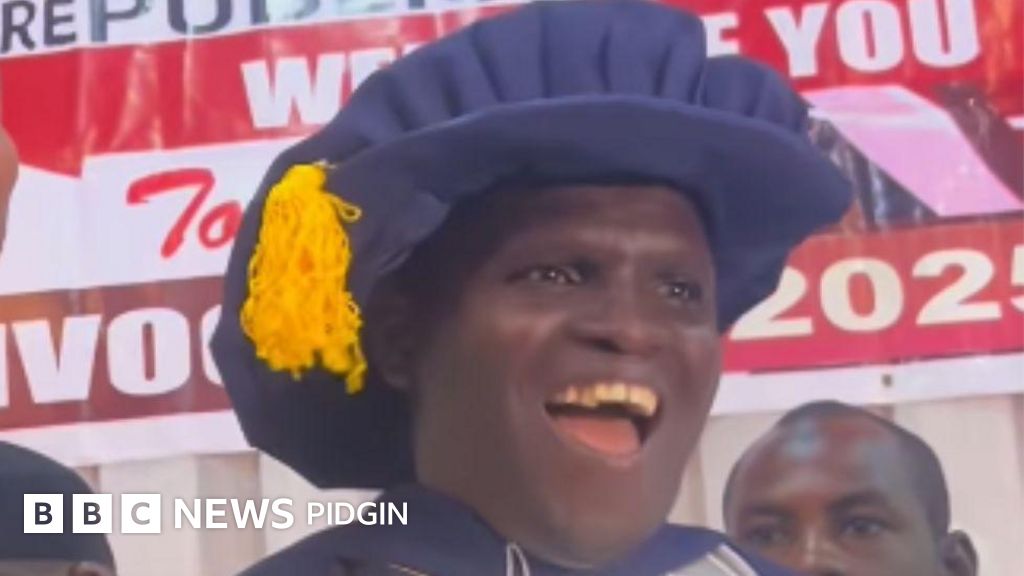Dauda Kahutu Rarara: Honorary Doctorate Controversy Unfolds
The Honorary Degree Award
On September 20, 2025, popular Nigerian musician Dauda Kahutu Rarara was awarded an honorary doctorate degree during a ceremony held at the Nicon Luxury Hotel in Abuja. The event was attended by numerous dignitaries, including Dikko Radda, the governor of Katsina State. Rarara, known for his political songs, celebrated this recognition, sharing the moment with his followers on social media.
University’s Disavowal
However, the excitement surrounding this event was quickly overshadowed by controversy. Just an hour after the ceremony, European-American University released a statement categorically denying any association with the honorary degree awarded to Rarara. The institution described the degree as fraudulent, asserting that no convocation had been authorized for such an award. They emphasized that the event had occurred without their knowledge or consent, characterizing it as a scam.
In their official statement, they clarified, “Disclaimer – Fake ‘convocation’ for Nigeria – the University does not confer any honorary degree on Dauda Kahutu Rarara.” They also mentioned that other names mentioned during the event, including Alhaji Ahmed Saleh Jnr. and Mustapha Abdullahi Bujawa, were also incorrectly recognized.
The Organizers: A Closer Look
The university took further steps to disassociate itself from the events by discrediting the organizers. They identified individuals like Musari Audu Isyaku and Idris Aliyu, who allegedly posed as university officials. The university confirmed that these individuals had no authority to represent them. Specifically, they pointed out that Idris Aliyu was not a member of their governing council and had been misrepresenting himself during the ceremony.
In a surprising turn, the institution announced that they would revoke Aliyu’s appointment as a Fellow due to his involvement in this fraudulent event. They also clarified that the current Vice Chancellor, Professor Luca Scotto di Tella de’ Douglas, differs from Dr. Josephine Egbuta, a former vice chancellor who was dismissed earlier in the year.
The University’s Location and Credibility
Adding to the disarray, the university disputed claims about its geographical affiliations. The institution clarified that it is not based in Dominica or Panama, as suggested by the event’s promotional materials. Rather, it is established as a non-profit private institution of higher education in France and holds a Royal Charter of Incorporation from the Kingdom of Bunyoro-Kitara in Uganda.
This statement indicates the university’s intent to pursue legal actions against those responsible for organizing the fraudulent convocation.
Who is Dauda Kahutu Rarara?
Dauda Kahutu Rarara, popularly known as Rarara, is a notable figure in Katsina State, Nigeria. He has gained recognition as a political songwriter and singer, particularly during his rise to fame in the 2015 general elections. His songs celebrated late President Muhammadu Buhari and the governor of Katsina State, positioning him as a prominent voice in Nigerian political music.
In a previous interview with the BBC, Rarara expressed admiration for Buhari’s honesty, claiming that his upbringing instilled values of integrity that he associates with the former president. However, Rarara also stated in 2020 that he would cease singing for the president until each impoverished individual in Nigeria received assistance.
The Aftermath of the Degree Scandal
Despite the scandal surrounding the honorary doctorate, Dauda Kahutu Rarara has yet to publicly address the situation. The fallout from this incident raises questions about the integrity of such recognitions and the accountability of those who misrepresent educational institutions. As the university seeks to rectify the situation and protect its reputation, the implications for Rarara and the event organizers remain to be seen.
This unfolding narrative highlights not only the complexities surrounding celebrity recognition in Nigeria but also the challenges faced by educational institutions in safeguarding their credibility in an age of misinformation.



